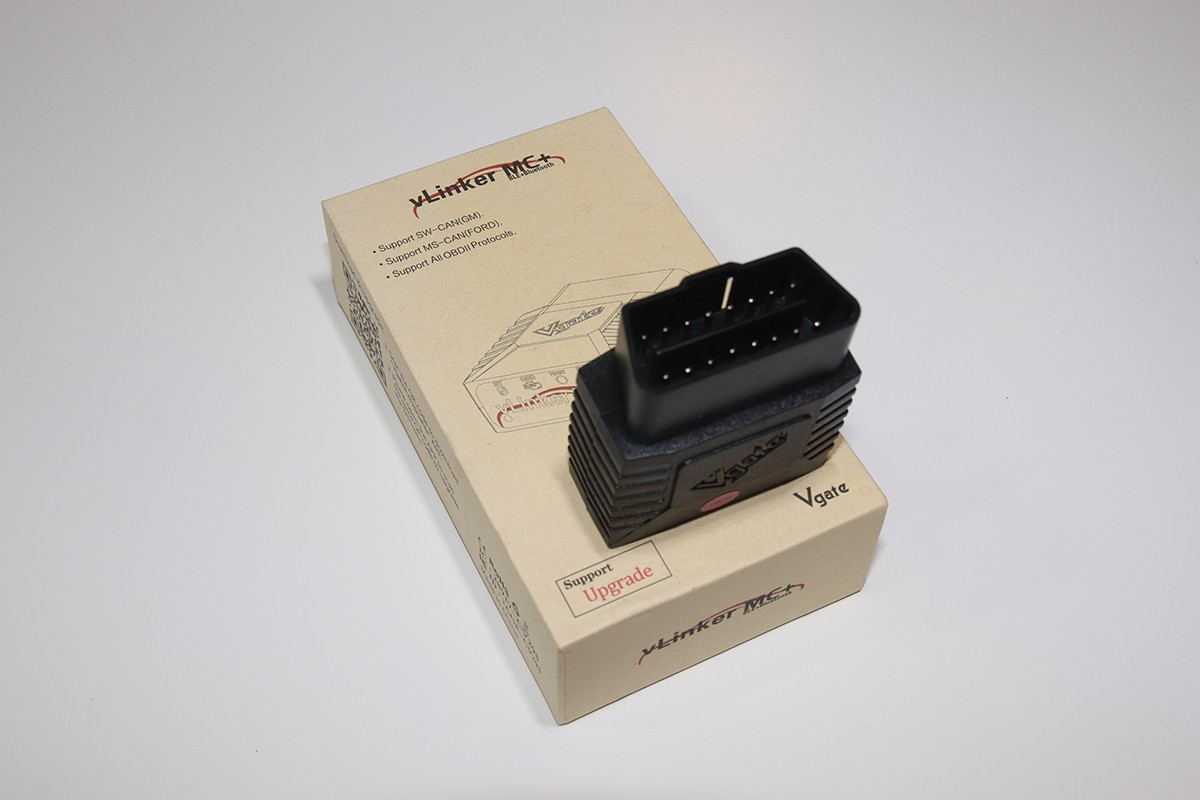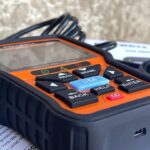Communicating with your car’s Engine Control Unit (ECU) is invaluable for diagnosing issues and ensuring your vehicle remains in peak condition. When the engine management light (EML) illuminates on your dashboard, the ECU holds the key to understanding why. Even without the EML, your ECU diligently logs potential problems and monitors essential functions like service intervals and equipment performance. To tap into this wealth of information, you need an OBD2 scanner. Bluetooth OBD2 scanners offer a convenient and affordable way to access this data using your smartphone or laptop. This article dives into the best Bluetooth OBD2 scanners available, helping you choose the right tool for your car diagnostic needs.
Understanding OBD2 Scanners
So, how exactly do you access your ECU and unlock all this vital vehicle information? The answer is simple: an OBD2 scanner, also known as a fault code reader. These devices plug into a standardized communication port in your car, known as the OBDII port. OBD stands for On-Board Diagnostics, and the “II” signifies the second generation of this technology. You’ll typically find this port located beneath the driver’s side dashboard, though it can sometimes be in the center console area.
The OBD2 system became a standard in the United States around 1996. Europe followed suit, mandating OBD2 connectivity for gasoline (petrol) cars from 2001 and diesel vehicles from 2004 onward.
The Testing Methodology for Bluetooth OBD2 Scanners
The Bluetooth OBD2 scanners evaluated here are compact dongles that wirelessly connect to your smartphone or laptop. They present a cost-effective alternative to dedicated scanners with built-in screens.
The testing process for these seven Bluetooth scanners followed a consistent approach. The first step involved downloading a compatible app to a phone or laptop. Some scanners offer proprietary apps, while others are compatible with various third-party applications.
Next, each Bluetooth device was plugged into the OBD2 port of test vehicles. With the ignition switched on, the corresponding app was launched. Establishing a Bluetooth connection between the scanner and the phone or laptop proved to be a straightforward process in all cases.
With extensive experience in car diagnostics, the aim was to determine the effectiveness of these budget-friendly Bluetooth OBD2 scanners. The results reveal whether these tools are valuable assets for car owners and enthusiasts.
Top Bluetooth OBD2 Scanners: A Detailed Look
vLinker MC+
Award: Best Overall & Best Value
Pros: Informative indicator lights for connection status; wide compatibility with third-party apps.
Cons: Extensive app selection may require time to find the optimal choice.
RRP: From $59.99
The vLinker MC+, manufactured by vGate, stands out for its user-friendly design and broad functionality. Its front panel features clear indicator lights that display connection status and power supply, simplifying the pairing process. A dedicated connect button further aids in establishing a connection with your chosen app. The vLinker MC+ supports numerous third-party apps on Android, iOS, and Windows platforms, offering flexibility in software selection.
Using the “Car Scanner” app, the vLinker MC+ demonstrated its diagnostic capabilities by accurately identifying a parking sensor fault on an Audi A3. It performed a thorough system scan and provided real-time data for monitoring engine parameters, fuel consumption, and even acceleration performance.
For an in-depth analysis, refer to the full review of the vLinker MC+ scanner.
OBDeleven
Award: Editor’s Choice
Pros: User-friendly fault code scanning; simple operation.
Cons: Optimized for VAG, BMW, and limited other vehicle brands.
RRP: From $88.34
The OBDeleven, a remarkably compact Bluetooth OBD2 scanner, presented some difficulty in removal from the OBD2 socket in certain vehicles due to its size. However, a keyring attachment offers improved grip, and a universal extension cable provides a more permanent solution.
This device utilizes a dedicated app tailored for specific manufacturers like VAG, BMW, and Rolls-Royce. During testing, vehicle identification was inconsistent, sometimes requiring manual VIN entry.
The free, entry-level app provides essential fault scanning and, in some cases, comprehensive scans of systems like audio, parking sensors, and airbags. Faults are presented with codes and supplementary information for diagnosis.
Beyond fault codes, the free app’s functionality is limited (live data is available for supported makes). Advanced features such as one-click car setting adjustments and system tests are accessible through Pro packages (annual subscription from $53.29) or credit purchases (from $2.19).
Backed by a two-year warranty and an intuitive free scanning app, the OBDeleven is a reliable tool for basic diagnostics, particularly for supported vehicle brands.
Read Rob’s comprehensive OBDeleven review here.
TopDon TopScan
Award: Approved
Pros: Excellent dedicated software for fault detection.
Cons: Incompatible with 32-bit Android phones.
RRP: $69.99
TopDon, a long-established manufacturer of professional diagnostic tools, offers the TopScan Bluetooth scanner for the DIY market. A dedicated app is required, but incompatibility issues were encountered with 32-bit Android phones (64-bit required). This incompatibility was unique among the tested scanners. For iPhones (iOS 10+), the TopGuru app is necessary, information that required contacting customer support to obtain. Both US and China-based support centers provided prompt assistance.
App installation and scanner connection are generally quick and easy. A diagnostic trouble code (DTC) scan successfully identified a parking sensor issue, a fault also detected by the OBDeleven and vLinker MC+. Vehicle identification was unsuccessful during testing, necessitating manual vehicle selection. The “Hot Functions” menu, offering resets for oil service and battery replacement, is a notable feature. However, live data streaming, freeze-frame data, and dashboard views are absent, limiting real-time engine data monitoring. The app is free for the first year, with subsequent annual subscriptions ranging from $49 to $99.
For more details, see Rob’s full review of the TopDon scanner.
OBDLink CX
Pros: Free dedicated app; compatible with third-party apps like BimmerCode.
Cons: Extremely small size makes it difficult to unplug.
RRP: From $79.99
The OBDLink CX is the entry-level Bluetooth scanner from OBDLink, an American manufacturer. Its ultra-compact size allows for discreet storage in a glovebox or center console. However, this small size made it challenging to grip and remove from the OBDII port. A 20cm extension cable from UK supplier Gendan resolves this issue.
A concise user guide with a QR code simplifies app download. Once installed and the device plugged in with the engine running, connection is typically established quickly, though it occasionally required a couple of attempts. The app features a straightforward and intuitive menu system.
Diagnostic response is rapid, but the OBDLink CX missed an existing parking sensor fault during testing.
The dashboard feature is a valuable addition, providing real-time readings for engine RPM, speed, MAF pressure, battery voltage, and fuel level. This can be combined with freeze-frame data when faults are logged. Trip logging, fuel consumption calculation, and mileage tracking are also included. Live data can be displayed graphically.
While OBDLink offers more feature-rich scanners, the CX serves as a capable and accessible entry point into car diagnostics.
Read the full OBDLink CX review.
OBDLink MX+
Pros: Free app with advanced diagnostic capabilities.
Cons: Marginal improvements over the significantly cheaper CX model.
RRP: From $139.95
OBDLink’s premium Bluetooth scanner, the MX+, offers a robust feature set and comes with comprehensive free functionality. It is also the most expensive scanner in this comparison. The app, compatible with smartphones and Kindle Fire devices, installs quickly, and device pairing is seamless. A button on the scanner aids connection if needed. A brief user guide simplifies setup.
The OBDLink app is exceptionally user-friendly, with a streamlined seven-option menu.
The MX+ excels in diagnostic depth, particularly with its enhanced diagnostics, detecting a parking sensor fault that did not trigger the EML.
Live data analysis is versatile, offering Dashboard instrument displays, Graph functions for data comparison, Map functionality for journey logging and MPG calculation, and Performance tools for acceleration timing.
The MX+ justifies its higher price for users requiring advanced diagnostics. However, for basic needs, the more affordable CX model presents a compelling alternative.
Explore the full OBDLink MX+ review.
UniCarScan UCSI-2100
Pros: Extensive selection of free dedicated and generic apps.
Cons: App abundance may be initially overwhelming.
RRP: From $79.99
The UniCarScan UCSI-2100, manufactured by WGSoft in Germany, is a compact Bluetooth OBD2 scanner compatible with a wide array of apps across smartphones (iOS and Android) and Windows PCs. These apps range from brand-specific options for BMW and Opel to generic apps like WGSoft’s ScanMaster.
Connection to phones or laptops is rapid after plugging into the OBDII port. The level of detail available depends on the chosen app. ScanMaster, for example, offers nine menu options, with some features requiring in-app purchases. Trouble codes are quickly identified, though the UniCarScan missed the parking sensor fault in testing. Freeze-frame data provides valuable context for fault analysis, and live data aids in-depth engine diagnostics.
The UniCarScan UCSI-2100 is a practical and budget-friendly solution for emergency diagnostics and routine fault checks during service intervals, easily stored in a glovebox.
Read Rob’s complete UniCarScan scanner review.
vLinker FD+
Pros: Broad support for third-party apps across Windows, Android, and iOS.
Cons: Extensive app compatibility may necessitate some trial-and-error to find the ideal app.
RRP: From $49.99
The vLinker FD+, another vGate product, is a globally available, compact Bluetooth scanner featuring indicator lights for connection status. Its small size can make removal from the OBD2 socket slightly awkward.
Selecting a compatible third-party app can be challenging due to the vast number of options, including dedicated apps. Pairing with smartphones or Windows laptops is straightforward and reliable. Depending on the app, users can access comprehensive fault information and live data for detailed diagnostics.
The vLinker FD+ provides a solid entry point into vehicle diagnostics and live data retrieval.
Explore the full vLinker FD+ review.
Choosing the Best Bluetooth OBD2 Scanner for Your Needs
Selecting the ideal Bluetooth OBD2 scanner can seem daunting given the numerous options. There’s no single “best” choice; the optimal scanner depends on your specific requirements. Consider your primary use case. If you primarily need to diagnose EML illumination, any of the tested scanners will suffice. However, some offer enhanced diagnostics for specific car brands, which is beneficial if your vehicle is supported. For BMW owners, scanners compatible with the BimmerCode app are recommended.
Verify scanner compatibility with your vehicle, especially for newer cars (2017 onwards) utilizing CAN-Bus communication protocols. CAN-Bus is an OBDII protocol supported by some scanners. Consult the manufacturer or supplier to confirm compatibility before purchase. Customer support was found to be consistently helpful during testing.
All tested scanners can reset the EML by clearing fault codes. If you require additional reset functions, such as oil service light resets, some scanners offer this as a paid extra, within a pro package, or through an annual subscription.
Advanced features like live data, MPG calculation, and dashboard displays are also available. Assess whether these are essential features or simply appealing extras based on your diagnostic needs.
For further information on car diagnostics, explore:
Interested in modified cars? Visit our Fast Car Events page for details on upcoming performance car events.

